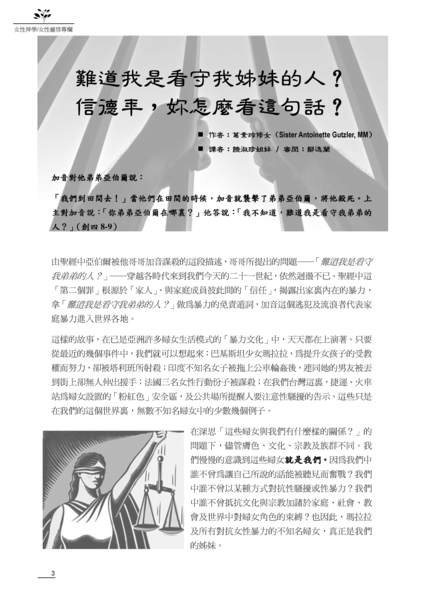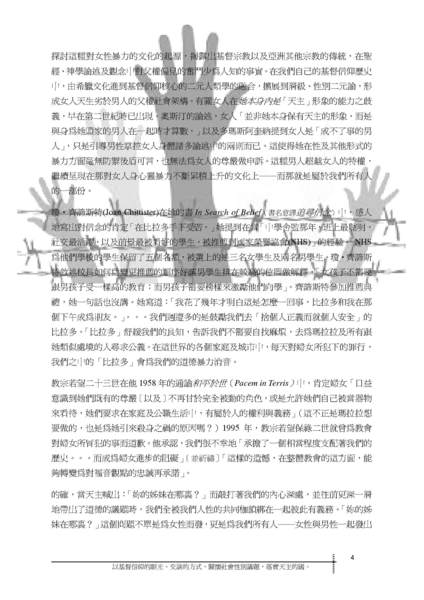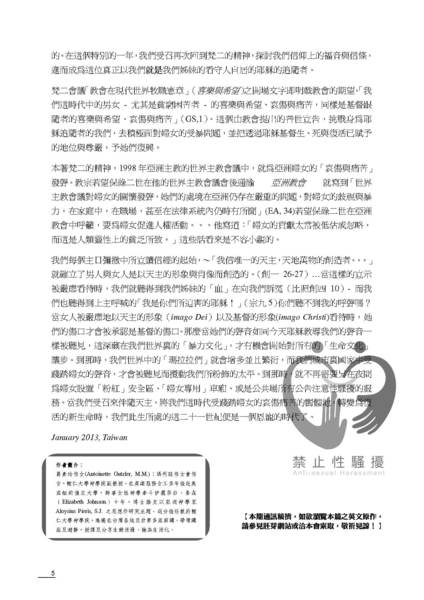

 字體:小 中 大
字體:小 中 大 |
|
|
|
| 2019/06/23 01:40:00瀏覽1348|回應0|推薦44 | |
Am I my sisters’ keeper? What do you say in this Year of Faith? 難道我是看守我姊妹的人? 信德年,妳怎麼看這句話?
Cain said to his brother Abel ‘Let us go out to the field.’ And when they were in the field, Cain rose up against his brother Abel and killed him. Then the Lord said to Cain, ‘Where is your brother Abel?’ He said, ‘I do not know; am I my brother’s keeper?’ Genesis 4: 8-9 , 加音對他弟弟亞伯爾說: 「我們到田間去!」當他們在田間的時候,加音就襲擊了弟弟亞伯爾,將他殺死.上主對加音說:「你弟弟亞伯爾在哪裏?」他答說:「我不知道,難道我是看守我弟弟的人?」 創四8-9 The question posed by the biblical narrative of the murder of Abel by Cain, his brother —“am I my brother’s keeper?”— still resounds throughout the ages and into our 21st century. This “second” biblical sin is rooted in “family” and the “trust” that follows the invitation into the field of betrayal. It brings to light the internalization of violence within the family, the evasion of responsibility for violence: “am I my brother’s keeper?”— and its globalization as Cain goes into the world as “a fugitive and a wanderer.” 由聖經中亞伯爾被他哥哥加音謀殺的這段描述,所呈現出來的問題──「難道我是看守我弟弟的人?」──穿越了各個時代來到我們今天身處的二十一世紀,依然迴盪不已.這個聖經中「第二」罪的根源,「家人」與「信任」是導致背叛的誘因,使得家庭暴力的國際化可以如此光明正大、讓「難道我是看守我弟弟的人?」這句話做為暴力的免責遁詞──這就像讓加音進入世界一樣地,讓「逃犯及流浪者」全球化. This story plays itself out each day in the “culture of violence” that has become the fabric of life for many women in Asia. We need only recall recent events: Malala, the young girl shot by the Taliban for her efforts in promoting education for young girls, the unnamed woman in India, dragged onto a bus, gang raped, thrown on the street with her boyfriend with no one to help, the three women activists murdered in France and, for us here in Taiwan, we note the “pink” safe areas for women on our subway and train stations and the public notices calling attention to sexual harassment. These are just a few examples of the violence against the countless unnamed women in our world. 這樣的故事,在已是亞洲許多婦女生活模式的「暴力文化」中,天天都在上演著.只要從最近的幾個事件中,我們就可以想起來:少女瑪拉拉,為提升女孩子的受教權而努力,卻被塔利班所射殺;印度無名女子被拖上公車輪姦後,連同她的男友被丟到街上卻無人伸出援手;法國三名女性活動份子被謀殺;我們這裏的台灣,捷運、火車站為婦女設置的「粉紅色」安全區,及公共場所提醒人要注意性騷擾的告示.這些只是在我們的這個世界裏,無數不知名婦女中的少數幾個例子. As ponder the question: “what do these women have to do with us,?” the reality slowly dawns that these women ARE us . . . albeit with different skin colors, cultures, religions and families. For who among us has not fought to have her voice heard? Who among us has not struggled in some way with sexual harassment and/or sexual violence? Who among us has not resisted the strictures that culture and religion place on women’s role in family, society, church and world? And so, Malala and all the unnamed women who are confronting violence against women are truly our sisters. 在深思「這些婦女與我們有什麼樣的關係?」的問題下,儘管膚色、文化、宗教及族群不同,這些婦女就是我們的事實也逐漸露出曙光.我們中誰不曾為所說的話被聽見而奮戰?我們中誰不曾以某種方式對抗性騷擾或性暴力(性侵)?我們中誰不曾抵抗文化與宗教於家庭、社會、教會及世界中對婦女角色的束縛?也因此,瑪拉拉及所有對抗女性暴力的不知名婦女,真正是我們的姊妹. Exploration of the genesis of this culture of violence against women uncovers the not widely acknowledged fact that Christianity, along with other religious traditions in Asia, struggles with patriarchal bias in scripture, theological treatises and precepts. In our own Christian history, the assimilation of a dualistic anthropology from Greek culture into the heart of Christianity expanded into a hierarchical, gender dualism which led to the patriarchal social construct that women are naturally inferior to man. Ambiguity about woman’s ability to “image” God in herself appears as early as the second-century. Augustine’s assertion that woman: “does not possess the image of God in herself, but only when taken together with the male who is her head,” and Aquinas’ regard of woman as “a misbegotten man” are only two of the claims that results in male control over woman’s body. This leaves her defenseless against sexual and other forms of violence and unable to claim for herself the dignity of her womanhood. This privileging of male over female continues to show itself in the spiraling culture of physical, psychological and spiritual violence against women – and it is a part of all of us. 在對這種女性暴力文化的起源做探討下,揭露出基督宗教,也包括亞洲其他宗教的傳統,為聖經、神學論述及觀念中父權傾向的捍衛(?or努力?),少為人知的事實.在我們自己的基督信仰歷史中,由希臘文化進到基督信仰核心的二元人類學融合,擴展到女人天生劣於男人的父權社會架構,所形成的兩性等級差別的觀念.有關女人的能力是她本身「天主」形象的模糊概念,早在第二世紀時已出現.奧斯汀的論述,女人「並非她本身保有天主的形象,而是與身為她頭家的男人在一起時才算數,」以及阿奎納提到女人是「成不了事的男人」,只是引導男性掌控女人身體諸多論述中的兩則而已.這使得她在性及其他形式的暴力方面毫無防禦後盾可言,也無法為女人的尊嚴做申訴.這種男人超越女人的特權,繼續呈現在那對女人身心靈暴力不斷累積上升的文化上──而那就是屬於我們所有人的一部份. In her book, In Search of Belief, Joan Chittister writes movingly of the creedal affirmation “suffered under Pontius Pilate.” She relates her experience of being “junior home room advisor the year when the brightest, most socially active and most promising students in the class were inducted into the National Honor Society (NHS).” Five places in the NHS were reserved for students from their school – three girls and two boys were chosen. Chittister relates how the headmaster changed the order of induction to give the boys a higher place explaining that “girls don’t need an education as much as boys do. And boys need role models to encourage them to study.” Chittister went to the induction ceremony and never said a word. She writes “It took years for me to realize it, but Pontius Pilate and I become cohorts that afternoon.” Pilate is all around us, encouraging us to “choose personal safety over personal integrity.” “Pilate” assuages our conscience and tells us that we need not disturb ourselves and seek justice for Malala and all those like her. The “Pilate” in us mutes our moral outrage against the crimes against women, which take place each day in homes and cities around the world. 瓊•齊諦斯特在她的書中,寫到感人的一段對信念的肯定「比拉多之苦.」她提到在當「中學舍監那年,班上最聰明,社交最活躍,以及前景最被看好的學生,被推薦到國家榮譽協會(NHS)」的經驗.「NHS為他們學校的學生保留了五個名額,被選上的是三名女學生及兩名男學生.瓊•齊諦斯特敘述校長如何為變更推薦的順序好讓男學生排在較高的位置做解釋,「女孩子不需要跟男孩子一樣高的教育;而男孩子需要榜樣來激動他們向學」.齊諦斯特參加推薦典禮,她一句話也沒講.她寫道:「我花了幾年才明白這是怎麼一回事,比拉多和我在那個下午只不過是步兵隊的一員.」...我們週遭多的是鼓勵我們去「捨個人正義而就個人安全」的比拉多.「比拉多」舒緩我們的良知,告訴我們不需要自找麻煩,去為瑪拉拉及所有跟她類似處境的人尋求公義.在這世界的各個家庭及城市中,每天對婦女所犯下的罪行,我們之中的「比拉多」會為我們的道德暴力消音. Pope John XXIII, in his 1958 encyclical Pacem in Terris, affirmed women’s “increasing awareness of their natural dignity [and that] far from being content with a purely passive role or allowing themselves to be regarded as a kind of instrument, they are demanding both in domestic and in public life the rights and duties which belong to them as human persons.” (Is this not what Malala was intent on doing and the reason for which she was marked for assassination?) In 1995, Pope John Paul II apologized to women for offenses against them by the Church. He acknowledged that unfortunately we are “heirs to a history which has conditioned us to a remarkable extent . . . and been an obstacle to the progress of women” [and prayed] that “this regret be transformed, on the part of the whole Church, into a renewed commitment of fidelity to the Gospel vision.” 教宗若望二十三世在他1958年的通諭地球上的和平(Pacem in Terris)中,肯定婦女「日益意識到她們既有的尊嚴〔以及〕不再甘於完全被動的角色,或是允許她們自己被當器物來看待,她們要求在家庭及在公開的生活中,有屬於人的權利與義務」(這不正是瑪拉拉想要做的,也是為她引來殺身之禍的原因嗎?)1995年,教宗若望保祿二世就曾為教會對婦女所冒犯的事而道歉.他承認,我們很不幸地「承擔了一個相當程度支配著我們的歷史...而成為婦女進步的阻礙」〔並祈禱〕「這樣的沉痛,在整體教會的這方面,能夠轉變為對福音觀點的忠誠再承諾」. Indeed, we are all bound in the common bonds of our humanity as the cry of God: “where is your sister?” strikes deeply in our hearts and brings profound moral issues to the fore. The question: “where is your sister?” is not one for women alone rather it is one for all of us – women and men together. In this special Year we are called to enter once again the spirit of the Second Vatican Council, explore the Gospels and the Creeds of our faith and become more faithful followers of Jesus who lived in the reality that we are our sisters’ keeper. 的確,當天主喊出:「妳的姊妹在哪裏?」而敲打著我們的內心深處,並往前更深一層地帶出了道德的議題.「妳的姊妹在哪裏?」這個問題不單是為女性而發,更是為我們所有人──女性與男性一起發出的.在這個特別的一年,我們受召再次回到梵二的精神,探討我們信仰上的福音與信德,進而成為這位真正以我們就是我們姊妹的看守人自居的耶穌的追隨者. The Second Vatican Council’s “Pastoral Constitution on the Church in the Modern World” (Gaudium et Spes) opens with words that articulate the church’s desire that “the joy and hope, the grief and anguish of the men and women of our time, especially those who are poor or afflicted in any way, are the joy and hope, the grief and anguish of the followers of Christ as well” (GS, 1). These testimony, given by the church to the world-at-large, challenges us as followers of Jesus to proactively confront this violence against women and restore to them the place and dignity that has been given us through the life, death and resurrection of Jesus, the Christ. 梵二會議「現代世界之教會牧靈憲章」(喜樂與希望)之開場文字即明載教會的期望,「我們這時代中的男性與女性,尤其是貧窮困苦者的喜樂與希望、哀傷與痛苦,同樣是基督跟隨者的喜樂與希望、哀傷與痛苦」(喜樂與希望GS,1).這個由教會提出的普世宣告,挑戰身為耶穌追隨者的我們,去積極面對婦女的受暴問題,並將我們所賦有耶穌基督生、死與復活的地位與尊嚴,還給她們. In this same spirit of Vatican II, the 1998 Synod meeting of Asian Bishops gave voice to the “grief and anguish” of the women of Asia. In his Post-Synodal Exhortation – Ecclesia in Asia – Pope John Paul II wrote that “The Synod voiced concern for women, whose situation remains a serious problem in Asia, where discrimination and violence against women is often found in the home in the workplace and even within the legal system” (EA, 34). John Paul II called on the church in Asia to promote human rights activities on behalf of women. He wrote that “the contributions of women have all too often been undervalued or ignored, and this has resulted in a spiritual impoverishment of humanity.” These words are not to be taken lightly. 本著梵二的精神,1998年亞洲主教的宗教大會中,就為亞洲婦女的「哀傷與痛苦」發聲.教宗若望保祿二世在他的宗教大會會後通諭──亞洲教會──就寫到「宗教大會談到婦女的關懷中,她們的處境在亞洲仍存在嚴重的問題,對婦女的歧視與暴力,在家庭中,在職場,甚至法律機構仍時有所聞」(EA, 34)若望保祿二世在亞洲教會中呼籲,要敦促婦女人權的運動...他寫道:「婦女的功勞太常被低估或忽略,而這是人類靈性上的貧乏所致.」這些話看來是不容小覷的. The opening faith declaration of the Creed, which we profess at each Sunday’s Eucharist – “we believe in one God, creator of heaven and earth . . .” affirms the creation of both male and female in the image and likeness of God (Gen 1:26-27). When this declaration is taken seriously we are able to hear the “blood” of our sisters calling out to us (cf. Genesis 4: 10) – and we also hear the Lord crying out: “I am Jesus who you are persecuting!” (Acts 9:5) Can you not hear my cry? When women are taken seriously as imago Dei (image of God) and imago Christi (image of Christ), their wounds will be acknowledged as the wounds of Christ. When their voice is heard as Christ’s voice teaching us today then, there is a chance that the “culture of violence” embedded in our world will begin to give way to a “culture of life” for all. Then the “Malala’s” of our world will increase and multiply and the voices of the violated women of our cities and nations will be heard and disturb our complacency. There will be no more need for “pink” safety areas for women at night, “women only” train cars or public service announcements calling attention to sexual harassment. This 21st century is a time of grace in our lifetime when we are called to partner God in turning the Calvary of “grief and anguish” of the violated women of our time into the new life of Resurrection. 我們每個主日彌撒當中宣讀信經時的開頭,~「我信唯一的天主,天地萬物的創造者...」就確立了男人與女人是以天主的形象與肖像而創造的.(創一26-27)…當這樣的宣示有被嚴肅看待,我們就聽得到我們姊妹的「血」在向我們訴冤(比較創四10)~而我們也聽得到上主呼喊的「我是你們所迫害的耶穌!」(宗九5)你們聽不到我的呼聲嗎?當女人被嚴肅地以天主的形象(imago Dei)以及基督的形象(imago Christi)看待時,她們的傷口就被認為是基督的傷口.那麼當她們的聲音如同今天耶穌教導我們的聲音一樣被聽見,這深藏在我們世界裏的「暴力文化」,就有機會開始對所有的「生命文化」讓步.到那時,我們世界中的「瑪拉拉們」就會增多並且繁衍出不同類型的「瑪拉拉們」,而我們城市裏國家中受踐踏婦女的聲音,才會被聽見而攪動我們所粉飾的太平.到那時,就不再需要另在夜間為婦女設置「粉紅」安全區、「婦女專用」車廂、或是公共場所有公告注意性騷擾的服務.當我們受召來伴隨天主,將我們這時代受踐踏婦女的哀傷痛苦髑髏地,轉變為復活的新生命時,我們此生所處的這二十一世紀便是一個美好的時代了. Antoinette Gutzler January 2013, Taiwan |
|
| ( 知識學習|其他 ) |












